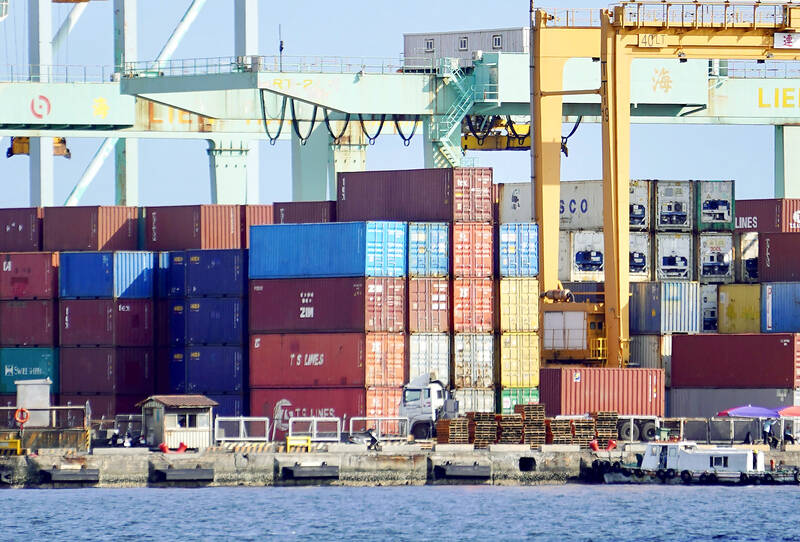Exports last month declined 14.1 percent from a year earlier to US$36.13 billion, contracting for the ninth consecutive month, as demand for electronics and non-tech products remained tepid amid a low season and global economic weakness, the Ministry of Finance said yesterday.
The downturn might persist this month and next quarter with a recovery likely in September or November, Department of Statistics Director-General Beatrice Tsai (蔡美娜) told an online news conference.
Demand for personal computers and peripheral products is already recovering, while inventory corrections tapered off for optical devices, Tsai said.

Photo: CNA
The trade data matched recent remarks by PC brands Acer Inc (宏碁) and Asustek Computer Inc (華碩) that the worst is over for them and that customers are renewing orders.
Shipments of electronics, notably chips, shrank 9.9 percent year-on-year to US$15.05 billion, as global inflation and interest rate hikes chilled demand for technology gadgets, Tsai said.
China’s reopening after lifting strict COVID-19 restrictions has not yet gained traction, as the vast economy needs time to recover and the ongoing electronics supply chain realignment is slowing its pace, she said.
On Tuesday, Taiwanese contract electronics maker Wistron Corp (緯創) confirmed that it is shutting factories in Jiangsu Province’s Taizhou and Kunshan as the company adjusts its global capacity given the general business environment and customers’ business strategies.
As inventory adjustments lingered at Taiwanese exporters, declines in their selling prices sharpened, Tsai said.
However, information and communication technology products again bucked the trend with an 11.9 percent advance in exports to US$5.7 billion, thanks to demand from Southeast Asia and Europe, she said.
Some server suppliers also benefited from a boom for artificial intelligence-related equipment, she added.
Local exporters might experience a high season after all, aided by new product releases and inventory replenishment, although outbound shipments for this month could shrink by 14 to 16 percent, Tsai said.
The latest data showed that a decline in exports to the US eased to 3.5 percent last month, compared with an annual decline of 10.3 percent in the previous month, while exports to Japan and Europe expanded 7.8 percent and 2.4 percent respectively.
Non-tech product categories did not fare as well, with shipments of mineral products plunging 49.1 percent, textiles dropping 36.2 percent and plastic products falling 31.1 percent, Tsai said.
Imports last month fell 21.7 percent from a year earlier to US$31.25 billion, giving Taiwan a trade surplus of US$4.89 billion, a more than twofold increase from a year earlier, ministry data showed.
The decline in imports last month followed a 20.2 percent drop the previous month.
Tsai attributed the weakness to local firms adopting belt-tightening measures and shunning purchases of capital equipment or agricultural and industrial material for export purposes.
In the first five months of the year, cumulative exports fell 16.7 percent year-on-year to US$169.81 billion and imports dropped 18 percent to US149.31 billion, with a trade surplus of US$20.5 billion, the ministry said.

Semiconductor shares in China surged yesterday after Reuters reported the US had ordered chipmaking giant Taiwan Semiconductor Manufacturing Co (TSMC, 台積電) to halt shipments of advanced chips to Chinese customers, which investors believe could accelerate Beijing’s self-reliance efforts. TSMC yesterday started to suspend shipments of certain sophisticated chips to some Chinese clients after receiving a letter from the US Department of Commerce imposing export restrictions on those products, Reuters reported on Sunday, citing an unnamed source. The US imposed export restrictions on TSMC’s 7-nanometer or more advanced designs, Reuters reported. Investors figured that would encourage authorities to support China’s industry and bought shares

FLEXIBLE: Taiwan can develop its own ground station equipment, and has highly competitive manufacturers and suppliers with diversified production, the MOEA said The Ministry of Economic Affairs (MOEA) yesterday disputed reports that suppliers to US-based Space Exploration Technologies Corp (SpaceX) had been asked to move production out of Taiwan. Reuters had reported on Tuesday last week that Elon Musk-owned SpaceX had asked their manufacturers to produce outside of Taiwan given geopolitical risks and that at least one Taiwanese supplier had been pushed to relocate production to Vietnam. SpaceX’s requests place a renewed focus on the contentious relationship Musk has had with Taiwan, especially after he said last year that Taiwan is an “integral part” of China, sparking sharp criticism from Taiwanese authorities. The ministry said

US President Joe Biden’s administration is racing to complete CHIPS and Science Act agreements with companies such as Intel Corp and Samsung Electronics Co, aiming to shore up one of its signature initiatives before US president-elect Donald Trump enters the White House. The US Department of Commerce has allocated more than 90 percent of the US$39 billion in grants under the act, a landmark law enacted in 2022 designed to rebuild the domestic chip industry. However, the agency has only announced one binding agreement so far. The next two months would prove critical for more than 20 companies still in the process

CHANGING JAPAN: Nvidia-powered AI services over cellular networks ‘will result in an artificial intelligence grid that runs across Japan,’ Nvidia’s Jensen Huang said Softbank Group Corp would be the first to build a supercomputer with chips using Nvidia Corp’s new Blackwell design, a demonstration of the Japanese company’s ambitions to catch up on artificial intelligence (AI). The group’s telecom unit, Softbank Corp, plans to build Japan’s most powerful AI supercomputer to support local services, it said. That computer would be based on Nvidia’s DGX B200 product, which combines computer processors with so-called AI accelerator chips. A follow-up effort will feature Grace Blackwell, a more advanced version, the company said. The announcement indicates that Softbank Group, which until early 2019 owned 4.9 percent of Nvidia, has secured a